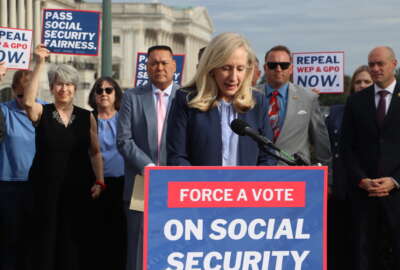Legislation to eliminate WEP and GPO clears the House
After the House passed the Social Security Fairness Act in a vote of 327 to 75, the legislation is now facing its next hurdle: passage in the Senate.
The House passed the Social Security Fairness Act Tuesday evening in a vote of 327 to 75, bringing the removal of the Windfall Elimination Provision and the Government Pension Offset closer than ever to reality.
Social Security’s WEP and GPO have been around for decades. The two provisions reduce and in some cases fully cancel out Social Security benefits for Civil Service Retirement System annuitants and other public sector employees who have worked in state and local government, as well as their spouses, widows and widowers.
The House’s vote came after Reps. Abigail Spanberger (D-Va.) and Garret Graves (R-Pa.), the original cosponsors of the reintroduced Social Security Fairness Act, filed a discharge petition in September to try to push the bill toward a vote. About one week later, the petition reached the 218-signature threshold needed to force the bill to the House floor.
The legislation will “provide a secure retirement to the hundreds of thousands of spouses, widows and widowers who are denied their spouses’ Social Security benefits simply because they chose careers of service,” Spanberger and Graves said Tuesday in a joint statement.
Through decades of advocacy for a repeal of WEP and GPO, support of the legislation has continually grown. The House’s version of the Social Security Fairness Act gained 330 cosponsors this year, making it one of the most highly supported bills in all of Congress.
The National Active and Retired Federal Employees Association, which has been pushing for the bill’s passage for years, said the legislation has never before made it this far.
“The overwhelming bipartisan support for the Social Security Fairness Act underscores the urgent need for this legislation, and with continued advocacy and support, we can bring about the necessary changes to protect the benefits of our nation’s retired public servants,” NARFE National President William Shackelford said in a statement.
Now the legislation faces its next hurdle: passage in the Senate. The Senate’s companion to the Social Security Fairness Act currently has 62 cosponsors.
“We encourage Senate leadership to build upon this clear momentum, bring our bipartisan effort up for a vote and deliver retirement security to Americans who have earned it,” Spanberger and Graves said.
Unlike the House, the Senate does not have a discharge petition procedure — the strategy that Spanberger and Graves used to force the floor vote in the House.
“In the Senate, we have the votes to defeat a filibuster, but it has to be brought to a vote,” John Hatton, NARFE’s staff vice president of policy and programs, told The Federal Drive with Tom Temin. “But somebody may object to proceeding, which could cause a two-week or so delay in getting it through.”
Federal groups, such as the Federal Managers Association, are urging the Senate to consider the bill before the end of this Congress.
The legislation will “provide this long-overdue relief for the public servants impacted by the GPO and WEP,” FMA National President Craig Carter said in a statement. “It is time to retire these provisions to the dustbin of history for the good of all civil servants who have been deprived of what they’ve earned for far too long.”
But at the same time, the Senate is facing “must-pass” legislation this year, including the National Defense Authorization Act and fiscal 2025 appropriations legislation, which is likely to take up a good deal of lawmakers’ time and attention.
Hatton said the biggest challenge for the Social Security Fairness Act is “convincing Majority Leader Chuck Schumer and other members of Senate that this is a priority that needs to get done now.”
Some members of Congress have also looked at alternatives to a full repeal of WEP and GPO. A couple of other bills aim to change the benefit calculation rather than entirely revoke the two provisions. Proponents of those bills raised concerns that a full repeal would impact Social Security’s solvency, while reforming the calculation would ensure “equity” between public and private sector workers.
If the Social Security Fairness Act is enacted, there would likely still be a period of delay before it becomes effective for those impacted by WEP and GPO.
“The whole thing turns into an operation that Social Security can execute,” Hatton said. “But it’s unclear how long it would take for the implementation.”
Copyright © 2025 Federal News Network. All rights reserved. This website is not intended for users located within the European Economic Area.
Drew Friedman is a workforce, pay and benefits reporter for Federal News Network.
Follow @dfriedmanWFED






